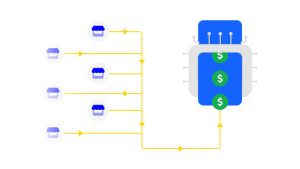Top Features Every Ecommerce Software Should Have
Introduction The ecommerce industry is booming, with millions of businesses around the world using digital platforms to reach a global audience. As a result, ecommerce softwar...

Introduction
The ecommerce industry is booming, with millions of businesses around the world using digital platforms to reach a global audience. As a result, ecommerce software has become the backbone of these digital businesses, giving them the tools to sell products and services effectively. However, not all ecommerce software is created equal. The right platform should offer a combination of flexibility, scalability, and key features to ensure a smooth shopping experience for customers and efficient management for business owners.
This article will cover the essential features that every ecommerce software should have to succeed in today’s competitive marketplace.
1. User-Friendly Interface
A smooth and intuitive user interface is crucial for any ecommerce software. Customers should be able to easily navigate the website, find products, add items to their cart, and complete the checkout process without any hassle. A well-designed UI improves the user experience and reduces bounce rates, increasing the likelihood that visitors will convert into paying customers.
Key components of a user-friendly interface include:
- Clear navigation menus that help users quickly find what they are looking for.
- Search functionality that includes filters and sorting options.
- Mobile responsiveness that ensures the site runs smoothly on smartphones and tablets.
- Fast loading times, as even a few seconds of delay can prevent customers from completing their purchase.

2. Mobile Optimisation
With the rapid growth of mobile commerce (m-commerce), it is critical for ecommerce software to deliver mobile-optimised websites and apps. Customers now expect to browse, shop, and pay directly from their smartphones or tablets without compromising on the experience.
Key mobile-optimised features include:
- Responsive design that adjusts to different screen sizes.
- Touch-friendly interfaces for easy navigation and checkout.
- Mobile payment options such as Apple Pay and Google Pay.
- Fast page loading to meet the needs of mobile users with slow internet connections.
3. Secure Payment Gateway
A secure and flexible payment gateway is vital for any ecommerce platform. Shoppers are increasingly concerned about online security, and having a reliable, well-known payment gateway increases trust and encourages transactions.
Key features of an ecommerce payment gateway should include:
- Multiple payment options, including credit/debit cards, PayPal, and mobile wallets.
- PCI DSS (Payment Card Industry Data Security Standard) compliance to ensure data protection.
- Fraud detection and prevention tools to minimise the risk of fraudulent transactions.
- Seamless integration with global currencies and local payment methods for international transactions.

4. Efficient Shopping Cart and Checkout Process
An optimised shopping cart and checkout process can make or break a sales process. Abandoned carts are a common problem for ecommerce businesses, and the checkout process is often to blame. A streamlined, seamless checkout ensures that customers complete their purchase quickly and without frustration.
Important elements include:
- Guest checkout options that allow customers to complete their purchases without creating an account.
- Progress indicators that show how many steps remain in the checkout process.
- Saved carts and wish lists that allow customers to come back and complete their purchase later.
- Auto-fill shipping and payment details to save customers time.
- Clear and up-front shipping costs to avoid unpleasant surprises at checkout.
5. Robust Product Management
Ecommerce businesses need a robust product management system to manage inventory efficiently. The software should make it easy to add, update, and categorise products while offering advanced tools to manage promotions, variations, and stock levels.
Key product management features include:
- Bulk product upload capabilities to manage large inventories.
- Product categories and filters to make it easier for customers to find products.
- Inventory tracking to ensure products are in stock and available.
- Product variations such as size, colour, and material options.
- Product reviews and ratings to build credibility and trust.
6. Search Engine Optimisation (SEO) Tools
Organic traffic from search engines is a significant driver of ecommerce sales. Therefore, ecommerce software should be equipped with SEO tools that help businesses rank higher in search results, resulting in increased visibility and traffic.
Important SEO features include:
- Custom URLs, meta tags, and alt texts for product pages.
- Structured data to help search engines understand product information.
- Creating a sitemap for better indexing of web pages.
- Mobile-friendly design, as mobile responsiveness is a critical factor for search engine rankings.

7. Customer Relationship Management (CRM) Integration
Customer relationship management is critical to long-term success in ecommerce. An integrated CRM system helps companies understand customer behaviour, track interactions, and maintain personalised communications, which is key to building brand loyalty.
CRM features should include:
- Customer data storage and management to track order history and preferences.
- Segmentation tools for personalised marketing campaigns.
- Automated follow-up emails for abandoned carts, post-purchase interactions, and customer reviews.
- Loyalty programs and reward systems to encourage repeat purchases.
8. Flexible Shipping and Fulfilment Options
Ecommerce businesses need flexible shipping solutions that accommodate both domestic and international orders. Ecommerce software should offer multiple shipping methods and easy integration with carriers.
Key features include:
- Real-time shipping rates from multiple carriers.
- Order tracking functionality to keep customers updated on delivery status.
- In-store pickup options for businesses with physical locations.
- International shipping support, including duty and tax calculations.

9. Analytics and Reporting
Detailed analytics are essential to understanding the performance of an online store. With robust reporting tools, businesses can track key performance indicators (KPIs) such as sales, conversion rates, and customer behaviour, enabling data-driven decisions.
Ecommerce software should offer:
- Customisable dashboards to display sales, traffic, and customer information.
- Conversion tracking to analyse the success of marketing campaigns.
- Inventory reports to monitor inventory levels and product reorders.
- Sales forecasting to predict future trends based on historical data.
10. Third-Party Integrations
No ecommerce software is an island. It should easily integrate with a variety of third-party tools and services to extend functionality and provide additional value. These integrations can include marketing tools, accounting software, customer service platforms, and more.
Common third-party integrations include:
- Email marketing platforms like MailChimp or Klaviyo for targeted campaigns.
- Accounting software like QuickBooks or Xero for financial management.
- Chat tools for real-time customer support.
- Social media integrations to promote products directly through social channels.
- Marketplace integrations with platforms like Amazon and eBay for multi-channel selling.

Conclusion
Choosing the right ecommerce software is critical to the success of any online business. By ensuring that the platform offers essential features such as a user-friendly interface, secure payment options, mobile optimisation, and robust product management, businesses can deliver a seamless and satisfying shopping experience to their customers. Additionally, features like CRM integration, SEO tools, and third-party integrations will enable businesses to scale efficiently and stay competitive in a rapidly evolving digital landscape.